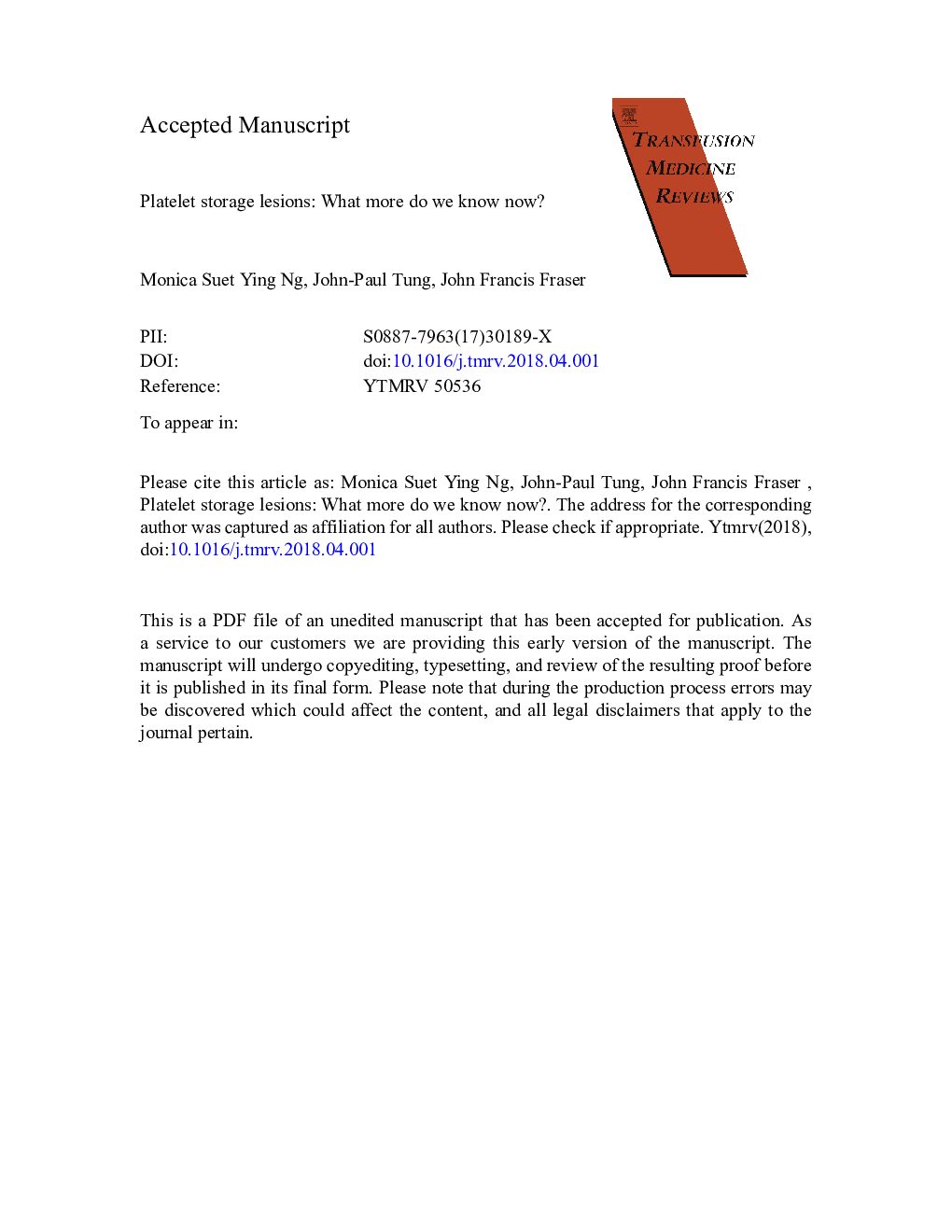| کد مقاله | کد نشریه | سال انتشار | مقاله انگلیسی | نسخه تمام متن |
|---|---|---|---|---|
| 8735167 | 1591026 | 2018 | 50 صفحه PDF | دانلود رایگان |
عنوان انگلیسی مقاله ISI
Platelet Storage Lesions: What More Do We Know Now?
ترجمه فارسی عنوان
ضایعات ذخیره سازی پلاکت: چه چیزی بیشتر از حالا می دانیم؟
دانلود مقاله + سفارش ترجمه
دانلود مقاله ISI انگلیسی
رایگان برای ایرانیان
کلمات کلیدی
Platelet storage lesionPSLTRIMVASPCD40LPMPsP-selectinTRALIPRTPrPCCIADPDINCHCD62PPlatelet additive solutionvWFcGMPLPS5-HTactivated factor VFVAAdenosine Triphosphate - آدنوزین تری فسفاتATP - آدنوزین تری فسفات یا ATPadenosine diphosphate - آدنوزین دی فسفاتtransfusion-related acute lung injury - آسیب ریوی حاد مرتبط با انتقال خونCorrected count increment - افزایش تعداد اصلاح شدهTransfusion-related immunomodulation - ایمونوادولوژی مرتبط با انتقالinterleukin - اینترلوکینTransfusion - ترانسفوزیون یا انتقال خونPar - توسطcluster of differentiation - خوشه تمایزStorage - ذخیره سازیCold storage - ذخیرهسازی سردMicroparticles - ذرات کوچکSerotonin - سروتونینAge - سنVon Willebrand factor - عامل فون ویلبراندconfidence interval - فاصله اطمینانPhosphatidylserine - فسفاتیدیلسرینVasodilator-stimulated phosphoprotein - فسفوپروتئین تحریک شده با واسوادولاتورlipopolysaccharide - لیپوپلی ساکاریدCD40 ligand - لیگاند CD40cyclic guanine monophosphate - مونوفسفات گوانین سیکلPlatelet microparticles - میکروارگانیسمهای وریدیPAS - نهNitric oxide - نیتریک اکسیدTransfusion reaction - واکنش انتقالplatelet-rich plasma - پلاسمای غنی از پلاکت، PRP، پی آر پیPlatelets - پلاکت هاplatelet concentrate - پلاکت کنسانترهPVC - پلیوینیل کلراید یا پیویسیbuffy coat - کت چرمیGlycoprotein - گلیکوپروتئینprotease-activated receptors - گیرنده فعال فعال پروتئاز
موضوعات مرتبط
علوم پزشکی و سلامت
پزشکی و دندانپزشکی
هماتولوژی
چکیده انگلیسی
Platelet concentrate (PC) transfusions are a lifesaving adjunct to control and prevent bleeding in cancer, hematologic, surgical, and trauma patients. Platelet concentrate availability and safety are limited by the development of platelet storage lesions (PSLs) and risk of bacterial contamination. Platelet storage lesions are a series of biochemical, structural, and functional changes that occur from blood collection to transfusion. Understanding of PSLs is key for devising interventions that prolong PC shelf life to improve PC access and wastage. This article will review advancements in clinical and mechanistic PSL research. In brief, exposure to artificial surfaces and high centrifugation forces during PC preparation initiate PSLs by causing platelet activation, fragmentation, and biochemical release. During room temperature storage, enhanced glycolysis and reduced mitochondrial function lead to glucose depletion, lactate accumulation, and product acidification. Impaired adenosine triphosphate generation reduces platelet capacity to perform energetically demanding processes such as hypotonic stress responses and activation/aggregation. Storage-induced alterations in platelet surface proteins such as thrombin receptors and glycoproteins decrease platelet aggregation. During storage, there is an accumulation of immunoactive proteins such as leukocyte-derive cytokines (tumor necrosis factor α, interleukin (IL) 1α, IL-6, IL-8) and soluble CD40 ligand which can participate in transfusion-related acute lung injury and nonhemolytic transfusion reactions. Storage-induced microparticles have been linked to enhanced platelet aggregation and immune system modulation. Clinically, stored PCs have been correlated with reduced corrected count increment, posttransfusion platelet recovery, and survival across multiple meta-analyses. Fresh PC transfusions have been associated with superior platelet function in vivo; however, these differences were abrogated after a period of circulation. There is currently insufficient evidence to discern the effect of PSLs on transfusion safety. Various bag and storage media changes have been proposed to reduce glycolysis and platelet activation during room temperature storage. Moreover, cryopreservation and cold storage have been proposed as potential methods to prolong PC shelf life by reducing platelet metabolism and bacterial proliferation. However, further work is required to elucidate and manage the PSLs specific to these storage protocols before its implementation in blood banks.
ناشر
Database: Elsevier - ScienceDirect (ساینس دایرکت)
Journal: Transfusion Medicine Reviews - Volume 32, Issue 3, July 2018, Pages 144-154
Journal: Transfusion Medicine Reviews - Volume 32, Issue 3, July 2018, Pages 144-154
نویسندگان
Monica Suet Ying BSc MBBS(hons), John-Paul Tung, John Francis Fraser,
